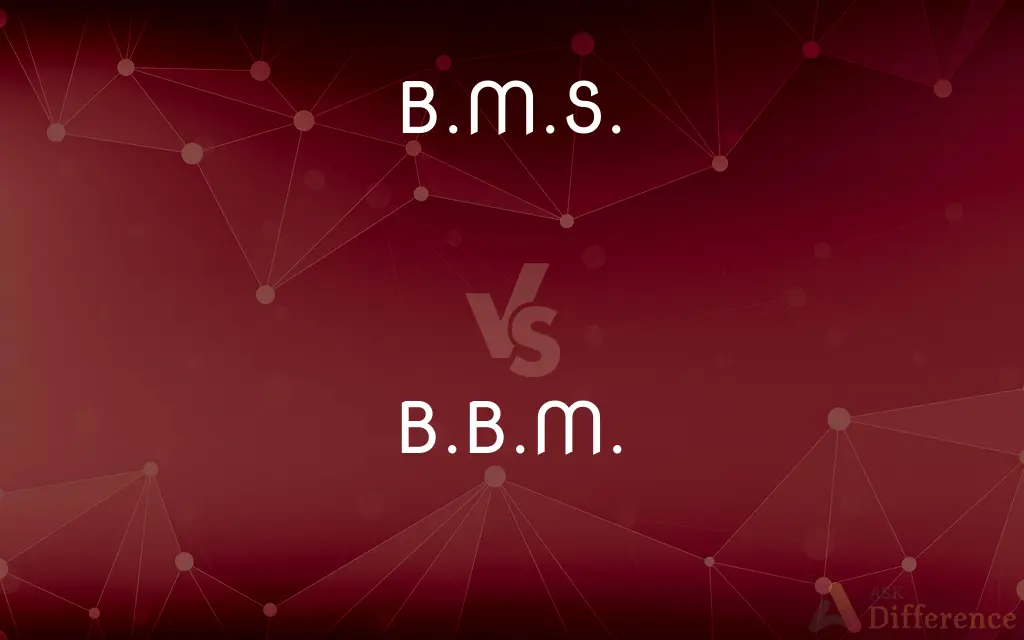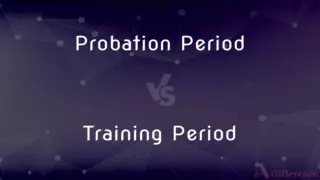B.M.S. vs. B.B.M. — What's the Difference?
By Tayyaba Rehman & Urooj Arif — Published on February 1, 2024
B.M.S. (Bachelor of Management Studies) focuses on analytical and leadership skills in management, while B.B.M. (Bachelor of Business Management) emphasizes practical business skills and management principles.

Difference Between B.M.S. and B.B.M.
Table of Contents
ADVERTISEMENT
Key Differences
B.M.S., or Bachelor of Management Studies, offers a comprehensive curriculum focusing on developing analytical and strategic thinking skills. This program often includes subjects like economics, business analytics, and strategic management. In contrast, B.B.M., or Bachelor of Business Management, is more centered on the practical aspects of business management. It covers areas such as marketing, finance, and human resources, aiming to prepare students for direct entry into the business world.
The B.M.S. program typically encourages a more theoretical approach, emphasizing research and critical analysis. Students learn to analyze complex business scenarios and develop innovative solutions. Conversely, B.B.M. prioritizes practical experience and application. It often includes more hands-on projects and real-world business scenarios, helping students to acquire practical skills useful for immediate employment.
Career prospects for B.M.S. graduates often lean towards roles that require strategic planning and analytical skills, such as management consulting or strategic analysis. B.B.M. graduates, on the other hand, are more likely to find opportunities in operational roles like sales management, retail management, or human resources, where practical business skills are essential.
In terms of curriculum, B.M.S. is more likely to incorporate interdisciplinary subjects, blending management with areas like psychology, sociology, and information technology. This provides a broader perspective on management. B.B.M., in contrast, tends to focus strictly on business disciplines, providing a deep dive into the core areas of business management.
B.M.S. programs often encourage international exposure and a global perspective, including opportunities for studying abroad or internships with multinational companies. B.B.M. programs may offer similar opportunities but tend to focus more on domestic business practices and local market dynamics.
ADVERTISEMENT
Comparison Chart
Focus
Analytical and leadership skills
Practical business skills
Curriculum
Theoretical, interdisciplinary
Practical, business-focused
Career Prospects
Strategic roles, consulting
Operational roles, management
Approach
Research-oriented, innovative
Hands-on, real-world application
International Exposure
Encouraged, global perspective
More local, domestic business focus
Compare with Definitions
B.M.S.
A degree focusing on management theory and practice.
She enrolled in a B.M.S. program to develop her leadership skills.
B.B.M.
Comparing business processes and performance metrics to industry bests.
B.B.M. helps us stay competitive.
B.M.S.
A service offering guidance and advice for business growth.
Joining the B.M.S. helped her small business thrive.
B.B.M.
A device that connects to high-speed internet.
Our B.B.M. ensures we have a fast and reliable internet connection.
B.M.S.
An undergraduate degree for medical science studies.
He completed his B.M.S. with a specialization in neuroscience.
B.B.M.
Marketing strategies focused on selling products or services to other businesses.
Their company excels in B.B.M. strategies.
B.M.S.
A system that controls and monitors a building's mechanical and electrical equipment.
The B.M.S. ensures our office environment is comfortable and energy-efficient.
B.B.M.
The process of maintaining and improving a business brand.
Effective B.B.M. has increased our market presence.
B.M.S.
A set of tools or processes for managing business operations efficiently.
Our company improved productivity after implementing a new B.M.S.
B.B.M.
A degree program emphasizing practical business skills.
He graduated with a B.B.M. and immediately started his own business.
Common Curiosities
What practical skills does B.B.M. emphasize?
B.B.M. emphasizes practical business skills like marketing, finance, and human resource management.
Does B.M.S. include international exposure?
B.M.S. programs often encourage international exposure and a global perspective.
Does B.M.S. integrate other disciplines?
B.M.S. often incorporates interdisciplinary subjects, blending management with other areas.
Can B.M.S. lead to strategic roles?
Yes, B.M.S. graduates are often suited for strategic roles like management consulting.
Are internships common in B.B.M. programs?
Yes, B.B.M. programs frequently include hands-on projects and internships.
What is a Business Management System (B.M.S.)?
It's a set of tools or processes for managing business operations efficiently.
What is B.M.S. focused on?
B.M.S. focuses on developing analytical and leadership skills in management.
Is B.B.M. suitable for immediate employment?
Yes, B.B.M. is designed to prepare students for direct entry into the business world.
What kind of career can a B.B.M. graduate expect?
B.B.M. graduates often find opportunities in operational roles like sales or human resources.
What is the role of a Building Management System (B.M.S.)?
It controls and monitors a building's mechanical and electrical equipment for efficiency.
How does B.M.S. differ in approach from B.B.M.?
B.M.S. is more research-oriented, while B.B.M. focuses on practical, real-world applications.
Are B.M.S. and B.B.M. degrees internationally recognized?
Yes, both degrees are recognized globally, though their focus might vary regionally.
Can a B.M.S. graduate work in business operations?
Yes, though they are more suited for strategic planning roles.
Is B.B.M. limited to domestic business practices?
While B.B.M. often focuses on local business, it can also include international business aspects.
What does Business Benchmarking (B.B.M.) involve?
It involves comparing business processes to industry bests to improve performance.
Share Your Discovery

Previous Comparison
Separation in Islam vs. Divorce in Islam
Next Comparison
Probation Period vs. Training PeriodAuthor Spotlight
Written by
Tayyaba RehmanTayyaba Rehman is a distinguished writer, currently serving as a primary contributor to askdifference.com. As a researcher in semantics and etymology, Tayyaba's passion for the complexity of languages and their distinctions has found a perfect home on the platform. Tayyaba delves into the intricacies of language, distinguishing between commonly confused words and phrases, thereby providing clarity for readers worldwide.
Co-written by
Urooj ArifUrooj is a skilled content writer at Ask Difference, known for her exceptional ability to simplify complex topics into engaging and informative content. With a passion for research and a flair for clear, concise writing, she consistently delivers articles that resonate with our diverse audience.












































